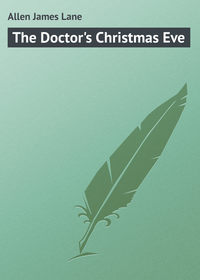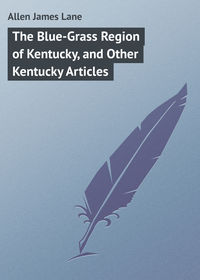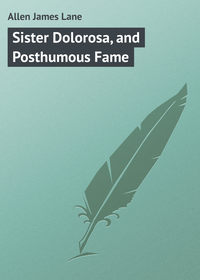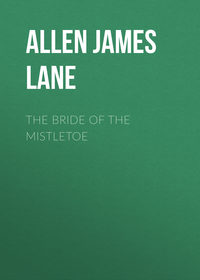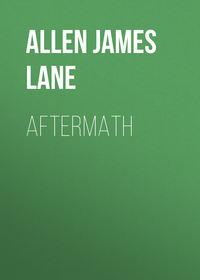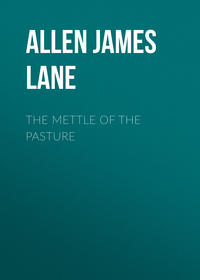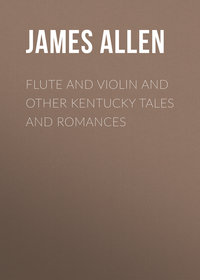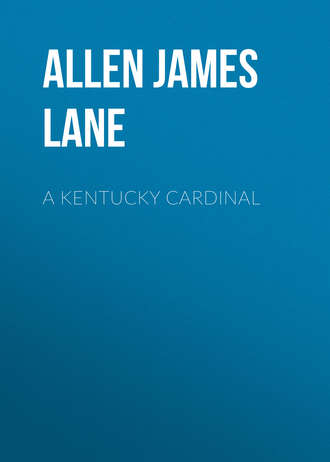 полная версия
полная версияA Kentucky Cardinal

James Lane Allen
A Kentucky Cardinal: A Story
Dedication
This to her from one who in childhood used to stand at the windows of her room and watch for the Cardinal among the snow-buried cedars.
I
All this New-year's Day of 1850 the sun shone cloudless but wrought no thaw. Even the landscapes of frost on the window-panes did not melt a flower, and the little trees still keep their silvery boughs arched high above the jeweled avenues. During the afternoon a lean hare limped twice across the lawn, and there was not a creature stirring to chase it. Now the night is bitter cold, with no sounds outside but the cracking of the porches as they freeze tighter. Even the north wind seems grown too numb to move. I had determined to convert its coarse, big noise into something sweet—as may often be done by a little art with the things of this life—and so stretched a horse-hair above the opening between the window sashes; but the soul of my harp has departed. I hear but the comfortable roar and snap of hickory logs, at long intervals a deeper breath from the dog stretched on his side at my feet, and the crickets under the hearth-stones. They have to thank me for that nook. One chill afternoon I came upon a whole company of them on the western slope of a woodland mound, so lethargic that I thumped them repeatedly before they could so much as get their senses. There was a branch near by, and the smell of mint in the air, so that had they been young Kentuckians one might have had a clew to the situation. With an ear for winter minstrelsy, I brought two home in a handkerchief, and assigned them an elegant suite of apartments under a loose brick.
But the finest music in the room is that which streams out to the ear of the spirit in many an exquisite strain from the hanging shelf of books on the opposite wall. Every volume there is an instrument which some melodist of the mind created and set vibrating with music, as a flower shakes out its perfume or a star shakes out its light. Only listen, and they soothe all care, as though the silken-soft leaves of poppies had been made vocal and poured into the ear.
Towards dark, having seen to the comfort of a household of kind, faithful fellow-beings, whom man in his vanity calls the lower animals, I went last to walk under the cedars in the front yard, listening to that music which is at once so cheery and so sad—the low chirping of birds at dark winter twilights as they gather in from the frozen fields, from snow-buried shrubbery and hedge-rows, and settle down for the night in the depths of the evergreens, the only refuge from their enemies and shelter from the blast. But this evening they made no ado about their home-coming. To-day perhaps none had ventured forth. I am most uneasy when the red-bird is forced by hunger to leave the covert of his cedars, since he, on the naked or white landscapes of winter, offers the most far-shining and beautiful mark for Death. I stepped across to the tree in which a pair of these birds roost and shook it, to make sure they were at home, and felt relieved when they fluttered into the next with the quick startled notes they utter when aroused.
The longer I live here, the better satisfied I am in having pitched my earthly camp-fire, gypsylike, on the edge of a town, keeping it on one side, and the green fields, lanes, and woods on the other. Each, in turn, is to me as a magnet to the needle. At times the needle of my nature points towards the country. On that side everything is poetry. I wander over field and forest, and through me runs a glad current of feeling that is like a clear brook across the meadows of May. At others the needle veers round, and I go to town—to the massed haunts of the highest animal and cannibal. That way nearly everything is prose. I can feel the prose rising in me as I step along, like hair on the back of a dog, long before any other dogs are in sights. And, indeed, the case is much that of a country dog come to town, so that growls are in order at every corner. The only being in the universe at which I have ever snarled, or with which I have rolled over in the mud and fought like a common cur, is Man.
Among my neighbors who furnish me much of the plain prose of life, the nearest hitherto has been a bachelor named Jacob Mariner. I called him my rain-cow, because the sound of his voice awoke apprehensions of falling weather. A visit from him was an endless drizzle. For Jacob came over to expound his minute symptoms; and had everything that he gave out on the subject of human ailments been written down, it must have made a volume as large, as solemn, and as inconvenient as a family Bible. My other nearest neighbor lives across the road—a widow, Mrs. Walters. I call Mrs. Walters my mocking-bird, because she reproduces by what is truly a divine arrangement of the throat the voices of the town. When she flutters across to the yellow settee under the grape-vine and balances herself lightly with expectation, I have but to request that she favor me with a little singing, and soon the air is vocal with every note of the village songsters. After this, Mrs. Walters usually begins to flutter in a motherly way around the subject of my symptoms.
Naturally it has been my wish to bring about between this rain-cow and mocking-bird the desire to pair with one another. For, if a man always wanted to tell his symptoms and a woman always wished to hear about them, surely a marriage compact on the basis of such a passion ought to open up for them a union of overflowing and indestructible felicity. They should associate as perfectly as the compensating metals of a pendulum, of which the one contracts as the other expands. And then I should be a little happier myself. But the perversity of life! Jacob would never confide in Mrs. Walter. Mrs. Walters would never inquire for Jacob.
Now poor Jacob is dead, of no complaint apparently, and with so few symptoms that even the doctors did not know what was the matter, and the upshot of this talk is that his place has been sold, and I am to have new neighbors. What a disturbance to a man living on the edge of a quiet town!
Tidings of the calamity came to-day from Mrs. Walters, who flew over and sang—sang even on a January afternoon—in a manner to rival her most vociferous vernal execution. But the poor creature was so truly distressed that I followed her to the front gate, and we twittered kindly at each other over the fence, and ruffled our plumage with common disapproval. It is marvellous how a member of her sex will conceive dislike of people that she has never seen; but birds are sensible of heat or cold long before either arrives, and it may be that this mocking-bird feels something wrong at the quill end of her feathers.
II
Mrs. Walters this morning with more news touching our incoming neighbors. Whenever I have faced towards this aggregation of unwelcome individuals, I have beheld it moving towards me as a thick gray mist, shutting out nature beyond. Perhaps they are approaching this part of the earth like comet that carries its tail before it, and I am already enveloped in a disturbing, befogging nebulosity.
There is still no getting the truth, but it appears that they are a family of consequence in their way—which, of course, may be a very poor way. Mrs. Margaret Cobb, mother, lately bereaved of her husband, Joseph Cobb, who fell among the Kentucky boys at the battle of Buena Vista. A son, Joseph Cobb, now cadet at West Point, with a desire to die like his father, but destined to die—who knows?—in a war that may break out in this country about the negroes.
While not reconciled, I am resigned. The young man when at home may wish to practise the deadly vocation of an American soldier of the period over the garden fence at my birds, in which case he and I could readily fight a duel, and help maintain an honored custom of the commonwealth. The older daughter will sooner or later turn loose on my heels one of her pack of blue dogs. If this should befall me in the spring, and I survive the dog, I could retort with a dish of strawberries and a copy of "Lalla Rookh"; if in the fall, with a basket of grapes and Thomson's "Seasons," after which there would be no further exchange of hostilities. The younger daughter, being a school-girl, will occasionally have to be subdued with green apples and salt. The mother could easily give trouble; or she might be one of those few women to know whom is to know the best that there is in all this faulty world.
The middle of February. The depths of winter reached. Thoughtful, thoughtless words—the depths of winter. Everything gone inward and downward from surface and summit, Nature at low tide. In its time will come the height of summer, when the tides of life rise to the tree-tops, or be dashed as silvery insect spray all but to the clouds. So bleak a season touches my concern for birds, which never seem quite at home in this world; and the winter has been most lean and hungry for them. Many snows have fallen—snows that are as raw cotton spread over their breakfast-table, and cutting off connection between them and its bounties. Next summer I must let the weeds grow up in my garden, so that they may have a better chance for seeds above the stingy level of the universal white. Of late I have opened a pawnbroker's shop for my hard-pressed brethren in feathers, lending at a fearful rate of interest; for every borrowing Lazarus will have to pay me back in due time by monthly instalments of singing. I shall have mine own again with usury. But were a man never so usurious, would he not lend a winter seed for a summer song? Would he refuse to invest his stale crumbs in an orchestra of divine instruments and a choir of heavenly voices? And to-day, also, I ordered from a nursery-man more trees of holly, juniper, and fir, since the storm-beaten cedars will have to come down. For in Kentucky, when the forest is naked, and every shrub and hedge-row bare, what would become of our birds in the universal rigor and exposure of the world if there were no evergreens—nature's hostelries for the homeless ones? Living in the depths of these, they can keep snow, ice, and wind at bay; prying eyes cannot watch them, nor enemies so well draw near; cones or seed or berries are their store; and in these untrodden chambers each can have the sacred company of his mate. But wintering here has terrible risks which few run. Scarcely in autumn have the leaves begun to drop from their high perches silently downward when the birds begin to drop away from the bare boughs silently southward. Lo! some morning the leaves are on the ground, and the birds have vanished. The species that remain, or that come to us then, wear the hues of the season, and melt into the tone of Nature's background—blues, grays, browns, with touches of white on tail and breast and wing for coming flecks of snow.
Save only him—proud, solitary stranger in our unfriendly land—the fiery grosbeak. Nature in Kentucky has no wintry harmonies for him. He could find these only among the tufts of the October sumac, or in the gum-tree when it stands a pillar of red twilight fire in the dark November woods, or in the far depths of the crimson sunset skies, where, indeed, he seems to have been nested, and whence to have come as a messenger of beauty, bearing on his wings the light of his diviner home.
With almost everything earthly that he touches this high herald of the trees is in contrast. Among his kind he is without a peer. Even when the whole company of summer voyagers have sailed back to Kentucky, singing and laughing and kissing one another under the enormous green umbrella of Nature's leaves, he still is beyond them all in loveliness. But when they have been wafted away again to brighter skies and to soft islands over the sea, and he is left alone on the edge of that Northern world which he has dared invade and inhabit, it is then, amid black clouds and drifting snows, that the gorgeous cardinal stands forth in the ideal picture of his destiny. For it is than that his beauty I most conspicuous, and that Death, lover of the peerless, strikes at him from afar. So that he retires to the twilight solitude of his wild fortress. Let him even show his noble head and breast at a slit in its green window-shades, and a ray flashes from it to the eye of a cat; let him, as spring comes on, burst out in desperation and mount to the tree-tops which he loves, and his gleaming red coat betrays him to the poised hawk as to a distant sharpshooter; in the barn near by an owl is waiting to do his night marketing at various tender-meat stalls; and, above all, the eye and heart of man are his diurnal and nocturnal foe. What wonder if he is so shy, so rare, so secluded, this flame-colored prisoner in dark-green chambers, who has only to be seen or heard and Death adjusts an arrow. No vast Southern swamps or forest of pine here into which he may plunge. If he shuns man in Kentucky, he must haunt the long lonely river valleys where the wild cedars grow. If he comes into this immediate swarming pastoral region, where the people, with ancestral love of privacy, and not from any kindly thought of him, plant evergreens around their country homes, he must live under the very guns and amid the pitfalls of the enemy. Surely, could the first male of the species have foreseen how, through the generations of his race to come, both their beauty and their song, which were meant to announce them to Love, would also announce them to Death, he must have blanched snow-white with despair and turned as mute as a stone. Is it this flight from the inescapable just behind that makes the singing of the red-bird thoughtful and plaintive, and, indeed, nearly all the wild sounds of nature so like the outcry of the doomed? He will sit for a long time silent and motionless in the heart of a cedar, as if absorbed in the tragic memories of his race. Then, softly, wearily, he will call out to you and to the whole world: Peace..Peace..Peace..Peace..Peace..!—the most melodious sigh that ever issued from the clefts of a dungeon.
For color and form, brilliant singing, his very enemies, and the bold nature he has never lost, I have long been most interested in this bird. Every year several pairs make their appearance about my place. This winter especially I have been feeding a pair; and there should be finer music in the spring, and a lustier brood in summer.
III
March has gone like its winds. The other night as I lay awake with that yearning which often beats within, there fell from the upper air the notes of the wild gander as he wedged his way onward by faith, not by sight, towards his distant bourn. I rose and, throwing the unseen and unseeing explorer, startled, as a half-asleep soldier might be startled by the faint bugle-call of his commander, blown to him from the clouds. What far-off lands, streaked with mortal dawn, does he believe in? In what soft sylvan water will he bury his tired breast? Always when I hear his voice, often when not, I too desire to be up and gone out of these earthly marshes where hunts the darker Fowler—gone to some vast, pure, open sea, where, one by one, my scattered kind, those whom I love and those who love me, will arrive in safety, there to be together.
March is a month when the needle of my nature dips towards the country. I am away, greeting everything as it wakes out of winter sleep, stretches arms upward and legs downward, and drinks goblet after goblet of young sunshine. I must find the dark green snowdrop, and sometimes help to remove from her head, as she lifts it slowly from her couch, the frosted nightcap, which the old Nurse would still insist that she should wear. The pale green tips of daffodils are a thing of beauty. There is the sun-struck brook of the field, underneath the thin ice of which drops form and fall, form and fall, like big round silvery eyes that grow bigger and brighter with astonishment that you should laugh at them as they vanish. But most I love to see Nature do her spring house-cleaning in Kentucky, with the rain-clouds for her water-buckets and the winds for her brooms. What an amount of drenching and sweeping she can do in a day! How she dashes pailful and pailful into every corner, till the whole earth is as clean as a new floor! Another day she attacks the piles of dead leaves, where they have lain since last October, and scatters them in a trice, so that every cranny may be sunned and aired. Or, grasping her long brooms by the handles, she will go into the woods and beat the icicles off the big trees as a housewife would brush down cobwebs; so that the released limbs straighten up like a man who has gotten out of debt, and almost say to you, joyfully, "Now, then, we are all right again!" This done, she begins to hang up soft new curtains at the forest windows, and to spread over her floor a new carpet of an emerald loveliness such as no mortal looms could ever have woven. And then, at last, she sends out invitations through the South, and even to some tropical lands, for the birds to come and spend the summer in Kentucky. The invitations are sent out in March, and accepted in April and May, and by June her house is full of visitors.
Not the eyes alone love Nature in March. Every other sense hies abroad. My tongue hunts for the last morsel of wet snow on the northern root of some aged oak. As one goes early to a concert-hall with a passion even for the preliminary tuning of the musicians, so my ear sits alone in the vast amphitheatre of Nature and waits for the earliest warble of the blue-bird, which seems to start up somewhere behind the heavenly curtains. And the scent of spring, is it not the first lyric of the nose—that despised poet of the senses?
But this year I have hardly glanced at the small choice edition of Nature's spring verses. This by reason of the on-coming Cobbs, at the mere mention of whom I feel as though I were plunged up to my eyes in a vat of the prosaic. Some days ago workmen went into the house and all but scoured the very memory of Jacob off the face of the earth. Then there has been need to quiet Mrs. Walters.
Mrs. Walters does not get into our best society; so that the town is to her like a pond to a crane: she wades round it, going in as far as she can, and snatches up such small fry as come shoreward from the middle. In this way lately I have gotten hints of what is stirring in the vasty deeps of village opinion.
Mrs. Cobb is charged, among other dreadful things, with having ordered of the town manufacturer a carriage that is to be as fine as President Taylor's, and with marching into church preceded by a servant, who bears her prayer-book on a velvet cushion. What if she rode in Cinderella's coach, or had her prayer-book carried before her on the back of a Green River turtle? But to her sex she promises to be an invidious Christian. I am rather disturbed by the gossip regarding the elder daughter. But this is so conflicting that one impression is made only to be effaced by another.
A week ago their agent wanted to buy my place. I was so outraged that I got down my map of Kentucky to see where these peculiar beings originate. They come from a little town I the northwestern corner of the State, on the Ohio River, named Henderson—named from that Richard Henderson who in the year 1775 bought about half of Kentucky from the Cherokees, and afterwards, as president of his purchase, addressed the first legislative assembly ever held in the West, seated under a big elm-tree outside the wall of Boonsborough fort. These people must be his heirs, or they would never have tried to purchase my few Sabine acres. It is no surprise to discover that they are from the Green River country. They must bathe often in that stream. I suppose they wanted my front yard to sow it in penny-royal, the characteristic growth of those districts. They surely distil it and use it as a perfume on their handkerchiefs. It was perhaps from the founder of this family that Thomas Jefferson got authority for his statement that the Ohio is the most beautiful river in the world—unless, indeed, the President formed that notion of the Ohio upon lifting his eyes to it from the contemplation of Green River. Henderson! Green River region! To this town and to the blue-grass country as Boeotia to Attica in the days of Pericles. Hereafter I shall call these people my Green River Boeotians.
A few days later their agent again, a little frigid, very urgent—this time to buy me out on my own terms, any terms. But what was back of all this I inquired. I did not know these people, had never done them a favor. Why, then, such determination to have me removed? Why such bitterness, vindictiveness, ungovernable passion?
That was the point, he replied. This family had never wronged me. I had never even seen them. Yet they had heard of nothing but my intense dislike of them and opposition to their becoming my neighbors. They could not forego their plans, but they were quite willing to give me the chance of leaving their vicinity, on whatever I might regard the most advantageous terms.
Oh, my mocking-bird, my mocking-bird! When you have been sitting on other front porches, have you, by the divine law of your being, been reproducing your notes as though they were mine, and even pouring forth the little twitter that was meant for your private ear?
As March goes out, two things more and more I hear—the cardinal has begun to mount to the bare tops of the locust-trees and scatter his notes downward, and over the way the workmen whistle and sing. The bird is too shy to sit in any tree on that side of the yard. But his eye and ear are studying them curiously. Sometimes I even fancy that he sings to them with a plaintive sort of joy, as though he were saying, "Welcome—go away!"
IV
The Cobbs will be the death of me before they get here. The report spread that they and I had already had a tremendous quarrel, and that, rather than live beside them, I had sold them my place. This set flowing towards me for days a stream of people, like a line of ants passing to and from the scene of a terrific false alarm. I had nothing to do but sit perfectly still and let each ant, as it ran up, touch me with its antennae, get the counter-sign, and turn back to the village ant-hill. Not all, however. Some remained to hear me abuse the Cobbs; or, counting on my support, fell to abusing the Cobbs themselves. When I made not a word of reply, except to assure them that I really had not quarrelled with the Cobbs, had nothing against the Cobbs, and was immensely delighted that the Cobbs were coming, they went away amazingly cool and indignant. And for days I continued to hear such things attributed to me that, had that young West-Pointer been in the neighborhood, and known how to shoot, he must infallibly have blown my head off me, as any Kentucky gentleman would. Others of my visitors, having heard that I was not to sell my place, were so glad of it that they walked around my garden and inquired for my health and the prospect for fruit. For the season has come when the highest animal begins to pay me some attention. During the winter, having little to contribute to the community, I drop from communal notice. But there are certain ladies who bow sweetly to me when my roses and honeysuckles burst into bloom; a fat old cavalier of the South begins to shake hands with me when my asparagus bed begins to send up its tender stalks; I am in high favor with two or three young ladies at the season of lilies and sweet-pea; there is one old soul who especially loves rhubarb pies, which she makes to look like little latticed porches in front of little green skies, and it is she who remembers me and my row of pie-plant; and still another, who knows better than cat-birds when currants are ripe. Above all, there is a preacher, who thinks my sins are as scarlet so long as my strawberries are, and plants himself in my bed at that time to reason with me of judgment to come; and a doctor, who gets despondent about my constitution in pear-time—after which my health seems to return, but never my pears.
So that, on the whole, from May till October I am the bright side of the moon, and the telescopes of the town are busy observing my phenomena; after which it is as though I had rolled over on my dark side, there to lie forgotten till once more the sun entered the proper side of the zodiac. But let me except always the few steadily luminous spirits I know, with whom is no variableness, neither shadow of turning. If any one wishes to become famous in a community, let him buy a small farm on the edge of it and cultivate fruits, berries, and flowers, which he freely gives away or lets be freely taken.


